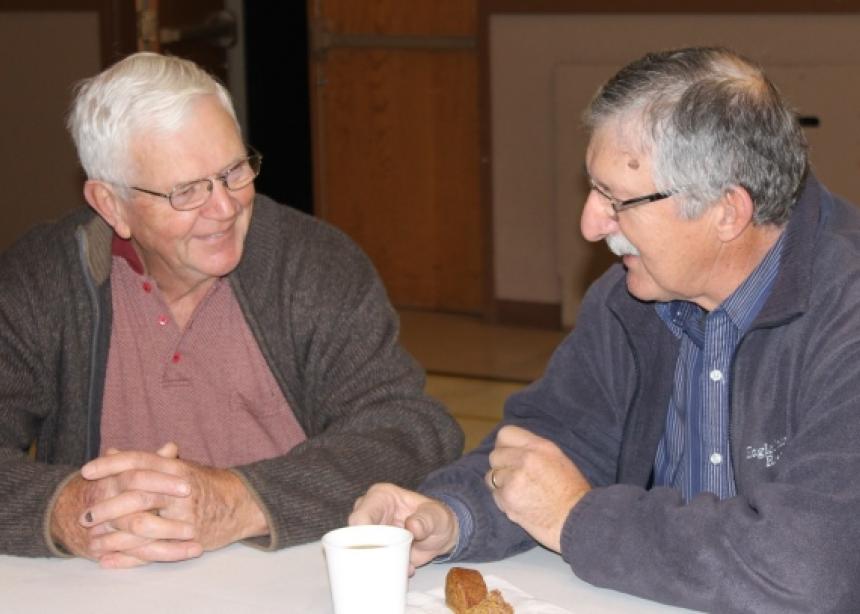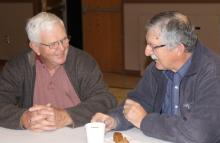“Peace Saturday,” a time of storytelling at Mount Royal Mennonite Church in Saskatoon on Nov. 9, 2013, featured four presenters with diverse points of view on the theme.
Don Regier of Rosthern was first to speak at the Mennonite Historical Society of Saskatchewan event. He recalled the convictions that led to his becoming a conscientious objector during the Second World War. “The Bible says, 'Do unto others as you would have them do unto you,'” said Regier. “That seemed like a good enough reason not to kill anyone.”
Regier spoke of the hardships and humiliation experienced by conscientious objectors during their alternative service, maintaining to this day, “Our victory is not in the battlefield. Our victory is in the cross.”
Charlie Clark, a Saskatoon city councillor who attends Osler Mennonite Church, told how his grandparents, Fred and Percival Ritchie, influenced his decision to study conflict resolution at Menno Simons College in Winnipeg. Reading selections from his grandfather's memoirs, Clark described how the tank commander in Italy during the Second World War came to believe that war does not solve conflicts.
“I marvel at the bravery I saw at the front,” wrote Ritchie, “but am terribly saddened to remember the many deaths and the suffering of the wounded. No war is worth the human sacrifice which goes with it. . . . We must work and pray for peace and appeal strongly to our governments to legislate for peace. There is no other way.”
Barb and Wilmer Froese, retired pastors from the Laird area, spoke about building peace with members of the Young Chippewayan First Nation. In the late 1970s, the Froeses learned that the land they farmed might still belong to the indigenous community. Emotions flared, but the issue remained unresolved for decades.
In the spring of 2006, the first nation approached people living in the area to hold a celebration on the land. They were not interested in getting the land back, the indigenous leaders said, but, rather, were seeking financial restitution from the government. So in August of that year, Mennonites and Lutherans met with members of the Young Chippewayan First Nation. They talked, ate together and signed a memorandum of understanding that they would work together “for peace, justice and sufficiency for all.”
The experience taught the Froeses that, like Mennonites, the Young Chippewayans are a people of peace and that peacebuilding can take place only when people meet face to face.
“We have so much to gain from peace, and so much to lose from hostility,” said Wilmer.
David Neufeld of Herschel told stories about his family's trip to Vietnam, where he learned from a Buddhist monk that people of other faiths also pray for peace.
He also spoke of working alongside indigenous people at the Ancient Echoes Interpretive Centre in Herschel, where the elders speak of a prophesied period of healing and reconciliation to be ushered in by the birth of a white buffalo. In 1994, a white buffalo calf was born in Montana, so the elders believe that the current period of time is one of healing and reconciliation. Mennonites need to share with them, said Neufeld, but they also need to learn from them.
To close his presentation, Neufeld sang, “We Are All One People”, a song written by Joseph Naytowhow, an indigenous storyteller and songwriter.
Common threads emerged in the discussion that followed:
• Mennonites are not unique in their desire for peace; people of other cultures and other faiths also work and pray for peace.
• Mennonites can learn from the peace traditions of others and from those who have adopted a peace stance through their experiences in war.
• By listening to one another and working together, the Mennonite peace witness is strengthened.
--Posted Dec. 10, 2013



Add new comment
Canadian Mennonite invites comments and encourages constructive discussion about our content. Actual full names (first and last) are required. Comments are moderated and may be edited. They will not appear online until approved and will be posted during business hours. Some comments may be reproduced in print.